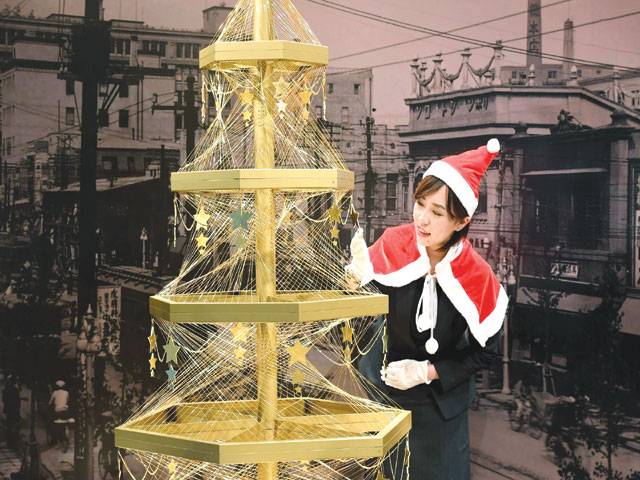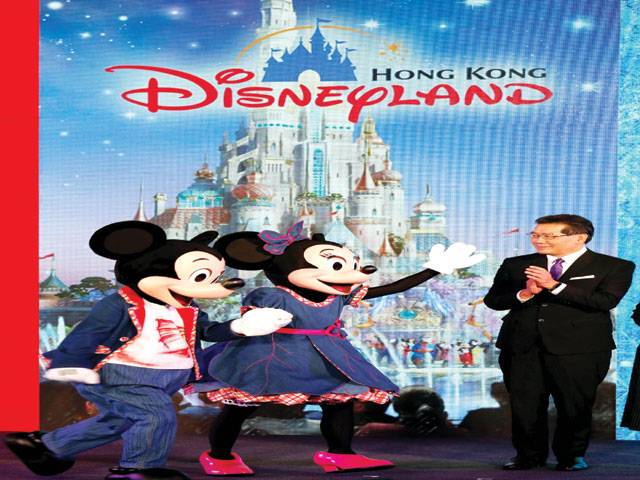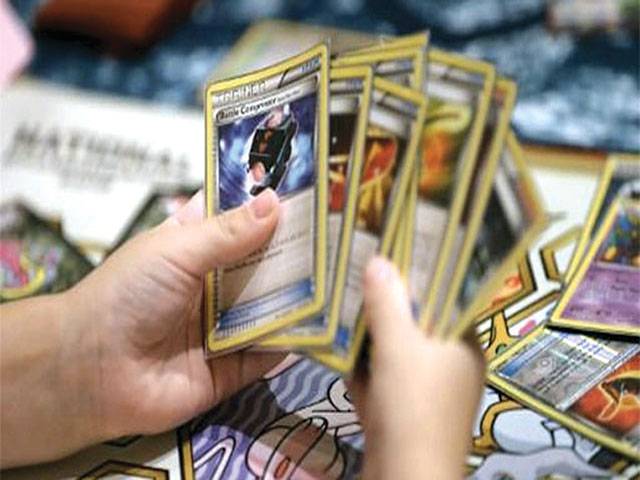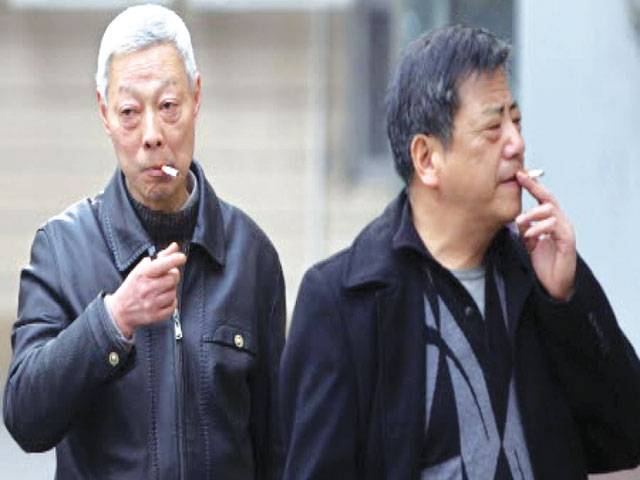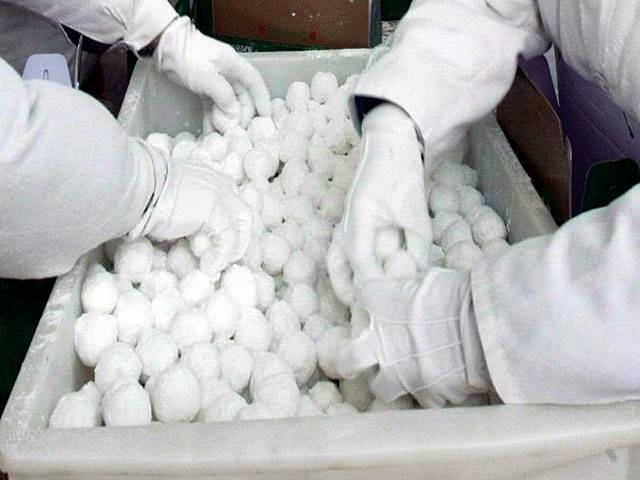Tokyo gets $2 million
Christmas tree
TOKYO (AFP): Want to impress the kids this Christmas? A Tokyo retailer has just the thing - if you’ve got about $2.0 million to spare. Jeweller Ginza Tanaka is going all out this season with a two-metre (6.6-foot) Christmas tree made with pure gold wire that’s as fine as angel hair pasta. The shop in Tokyo’s glitzy Ginza district says the 19 kilogramme (42 pound) tree is made up of more than 1,200 metres (3,950 feet) of gold wire. “The wire is made of the finest gold which has a 99.999 percent purity level,” Ginza Tanaka store manager Takahiro Ito told AFP on Tuesday. Ito said the tree was made by the jeweller’s in-house artisans. The price tag? A cool 200 million yen ($1.8 million). While it may be a stretch finding a buyer, Ito said he hoped the opulent display would show off Japan’s world-famous craftmanship. “We want them to see our great technique and craftsmanship, and the glittering beauty of gold,” he said.
Hong Kong Disneyland gets
‘Frozen’ in $1.4b upgrade
HONG KONG (AFP): Hong Kong Disneyland announced Tuesday a $1.4 billion expansion featuring popular characters from the “Frozen” and “Marvel” movies, despite competition from a massive Disney resort in Shanghai. The upgrade at the world’s smallest Disney resort comes after Shanghai’s theme park opened in mid-June, pulling in nearly a million visitors within its first month of operation. The Hong Kong expansion will start in 2018, ending in 2023, with new attractions opening almost every year during that period. New attractions will also include a transformed castle, the central landmark in all of Disney’s six global resorts. Animated mega-hit “Frozen” raked in nearly $1.3 billion in global ticket sales, while Marvel has had a string of blockbuster successes based on its roster of superheroes including Iron Man and Captain America.
“This would attract more high-spending and overnight visitors from more diversified market sources,” the city’s commerce and economic development minister Gregory So said.
Hong Kong Disneyland has had three years of profitability since 2012, but attendance took a hit in 2015 after mass pro-democracy rallies rocked the city a year previously.
In April the resort fired scores of staff after reporting an annual loss, the first large-scale sacking since its opening, reports said.
Hong Kong Disneyland is 52 percent-owned by the city’s government.
China to control public smoking
nationwide by year-end
SHANGHAI (AFP): China, the world’s biggest cigarette producer and consumer, aims to impose national smoking-control regulations by the end of this year, authorities said Tuesday. The Asian giant has the world’s largest smoking population, with 28 percent of all adults and half of its adult men estimated to regularly use cigarettes. The World Health Organization (WHO) says a million people in China die of tobacco-related illnesses annually, with second-hand smoke contributing to some 100,000 deaths each year. In June 2015 Beijing municipality adopted the toughest anti-smoking legislation in the country, banning smoking in offices, restaurants, hotels and hospitals. Venues that flout the ban can face fines of up to 10,000 yuan ($1,450). Last week Shanghai also amended its tobacco regulations to ban indoor smoking and also outdoor smoking at public areas such as bus stops, schools and stadiums. At a WHO conference in the commercial hub, government health spokesman Mao Qunan indicated measures would be rolled out across the country.
“The nationwide regulation to control smoking in public is undergoing the legislative process and is hoped to be announced and carried out this year,” he told reporters.
“Strictly controlling smoking in public places through legal forms is an advancement for health.”
Nearly 20 cities have already drawn up public no-smoking rules, Mao added. The commission first drafted the law in late 2014.
Enforcing anti-smoking measures can be difficult in China as the state-run tobacco industry provides the government with colossal sums - 1.1 trillion yuan ($160 billion) in taxes and profits in 2015, up 20 percent year-on-year.
China’s tobacco regulator shares offices and senior officials with the state-owned China National Tobacco Corp - a near-monopoly and by far the world’s biggest cigarette producer.
WHO director-general Margaret Chan called on more cities “to make sure that the tobacco control in China will make further progress”.
Rare Pokemon card sells for
record $54,970 at auction
LOS ANGELES (AFP): An extremely rare Pokemon trading card - the “Pikachu Illustrator” - was purchased for a record $54,970 at auction, organizers of the sale said Monday. Dallas-based Heritage Auctions said the card, of which 39 were ever made, sold to an unidentified Hong Kong collector at Saturday’s auction in Beverly Hills. “The Pikachu Illustrator card was given in January of 1998 to winners of the CoroCoro Comic Illustration Contest,” Michael Halperin, a spokesman for Heritage Auctions, told AFP. He said only 10 of the cards are known to be in mint condition and it is unclear how many are still privately owned. The “Pikachu Illustrator” first sold in the early 2000s for around $23,000, Halperin said. The card, considered the most valuable and iconic Pokemon card among collectors, was designed by Atsuko Nishida, one of the chief Pokemon graphic illustrators. The card depicts the fan-favorite yellow rodent Pikachu, holding what appear to be drawing utensils.
It was put up for auction by a private collector in the United States in the wake of the popularity surrounding the Pokemon Go app, which has more than 20 million active users.
Halperin said the seller, who is in his mid-20s and did not wish to be identified, had begun collecting Pokemon cards in his teens.
The Pokemon phenomenon first emerged in Japan in 1996 before becoming a global sensation.
Japan man dies after rice
ball eating contest
TOKYO (AFP): A 28-year-old man died in Japan after choking on a rice ball at a speed-eating contest, an event organiser said Tuesday. The man, whose name was withheld, died on November 16 in hospital three days after choking, said the local farmer’s cooperative that sponsored the event in the western city of Hikone. Contestants competed to see how fast they could eat five “onigiri” balls of locally grown steamed rice, a popular Japanese comfort food. The man shoved his fifth rice ball into his mouth before passing out and was rushed to a local hospital where he later died, the organiser said. The contest was composed of three sets of five contestants each. “We had the first and the second sets finished and were watching the third group when this happened,” said the official at the cooperative, who declined to be named. Eating contests are popular events at various regional fairs held in Japan to promote local produce and culture, as in other countries where choking deaths have been reported.
Japan’s best known competitive eater is Takeru Kobayashi, who won fame as champion of an annual hot dog eating contest in New York.
After news of the latest death was reported, New York-based Kobayashi tweeted warnings about amateurs trying to eat too much too fast.

